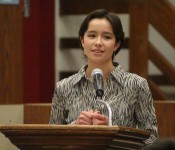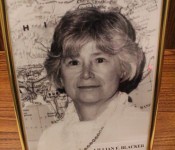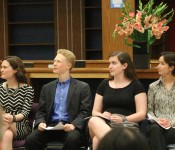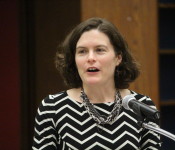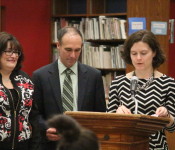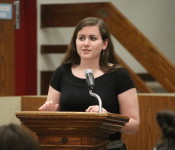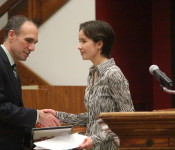Photo: The Blacker Prize winners: (from left, front) Eunice Lee, Devon Carter, Sarita Shea with English advisors (back) Nathaniel Markley and Dr. Kristin Comment.
They unveiled society’s truth in the writings of a French existentialist, explored the paradigm of linguistic suppression within dystopian literature, and provide their thoughts on women, men, love and marriage in the novels of Jane Austen.
For the past 34 years, Belmont High School seniors have slogged through a process in which, as one said, “is a year-long marathon” in which selecting the right – or wrong – author must mesh a theme, no matter how messy the process.
But the senior theses is not the culmination of a single project, but of 12 years of English language learning and instruction, said Lindsey Rinder, director of English, ELL and Reading for the Belmont School District.
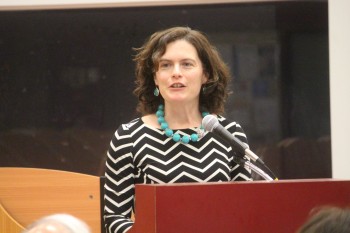
From writing their first stories in first grade to creating critical analysis of literature with primary and secondary sources when they graduate, “this is testimony to both our students endeavor and to their education. I believe Belmont High School’s dedication to the senior thesis and to writing education in general singles it out from most secondary schools,” said Rinder.
The senior thesis is not simply a writing exercise, but also the study of literature “that helps us understand who we are,” as it encapsulates and dissects our most human qualities; “our passions and our frustrations, our capacity for great deception as well as brutal honesty, our dignity as well as our most grieves failings.”
On Wednesday, May 20, the Belmont Public School English Department honored three senior student theses writers with the Lillian F. Blacker Prizes for Excellence in Writing.
“Tonight we celebrate our students and ourselves as literate and literary creatures,” said Rinder, as she introduced the honorees; first prize winner Sarita Shea, second prize Devon Carter and third prize Eunice Lee.
The three-winning works can be viewed below.
If there was one certainty when she began the theses process, “I was very clear about just one thing … I had absolutely no idea what I wanted to do,” said Lee, who will be attending Harvard College in the fall. Her work, “Freedom in Exile: The Development of Intellectual Independence in Vladimir Nabokov’s Novels.”
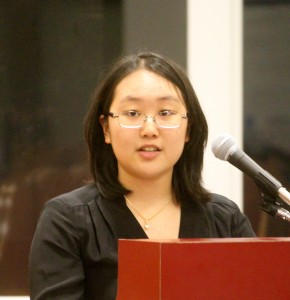
So she took a list of authors provided to the students, “so I took about four of these … based on how famous their names were and started reading excerpts from their novels.”
“I found out that this was a very important part of the selection process, sampling the flavor of an author’s writing before one commits to the full course,” said Lee. She finally selected Nabokov as his prose “is absolutely gorgeous.”
The Brown-bound Carter selected the Romantic poet Lord Byron – “The Torrent With the Many Hues of Heaven”: The Replacement of Traditional Morality in Works of Lord Byron” – for how he influenced his generation through not only through his works but also with scandals and outrageous behavior, becoming “the first modern celebrity. Think Kardashian, but talented.”
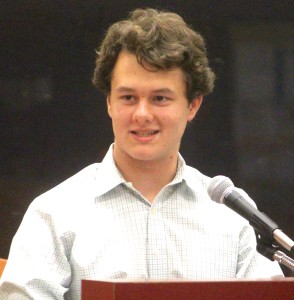
“I have always been interested in stories, and the way we as humans tell stories and why we tell them,” said Shera, whose theses featured the role of storytelling in the novels of Toni Morrison.
Since storytelling shapes every part of a culture and vice versa, “stories do not exist in isolation … they are constantly interact with the culture that produce them and the cultures that absorb them,” said Shera, who will matriculate at Hampshire College this fall.
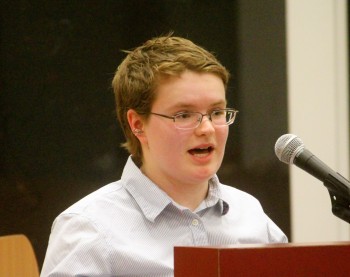
“As stories change, so do we. As we change, so do stories,” she said.
For Rinder, these and other notable theses are examples of how students have been transformed into richer learners and people through this task.
“We see these students in a new light tonight. You are no longer just our children and our students. Your commitment to your work has made you thinkers, intellectuals and writers. You created something new,” said Rinder.
“Now, students, it is incumbent upon you to go out into the world and find a place for your voice. You have something to say, something to contribute.”
Eunice Lee Blacker 3rd Place 2015
Sarita Shera Blacker 1st Place 2015
